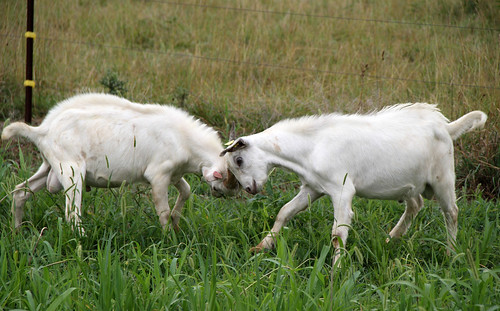Plans are underway for the 2012 Western Maryland Pasture-Based Meat Goat Performance Test.
The test is open to male goats of any breed or breed cross, with or without registration eligibility. Goat producers from any state may consign up to five goats to the test. It is recommended that producers consign at least two goats and that consigned goats be half-sibs (sired by the same buck).
Eligible goats must weigh between 35 and 70 lbs. upon delivery to the test site on June 2. They must have been born between December 20, 2011, and March 20, 2012, inclusive. The goats will need to have been weaned for at least 2 weeks and have received two inoculations for overeating diseases and tetanus (CD-T). The goats should be adjusted to a forage-based diet.
The nomination period will be from April 1 until May 15. A $20 deposit will be due at the time of nomination. After a short adjustment period, starting weights will be recorded on Thursday, June 7. The test will officially last for 98 days. The final data will be collected on Thursday, September 13.
The goats will be worked every two weeks to determine body weights, FAMACHA, body condition, coat condition, and dag scores. Towards the end of the test, the goats will be scanned (with ultrasound) to determine rib eye area and fat thickness.
They will be evaluated for reproductive soundness and structural correctness. In 2012, hooves will be more closely examined, as hoof growth and health is an important aspect of a goat's fitness.
Proposed changes to the goat test will be shared via future blog entries.
The test is open to male goats of any breed or breed cross, with or without registration eligibility. Goat producers from any state may consign up to five goats to the test. It is recommended that producers consign at least two goats and that consigned goats be half-sibs (sired by the same buck).
Eligible goats must weigh between 35 and 70 lbs. upon delivery to the test site on June 2. They must have been born between December 20, 2011, and March 20, 2012, inclusive. The goats will need to have been weaned for at least 2 weeks and have received two inoculations for overeating diseases and tetanus (CD-T). The goats should be adjusted to a forage-based diet.
 |
| A couple of bucks from last year's test. |
The nomination period will be from April 1 until May 15. A $20 deposit will be due at the time of nomination. After a short adjustment period, starting weights will be recorded on Thursday, June 7. The test will officially last for 98 days. The final data will be collected on Thursday, September 13.
The goats will be worked every two weeks to determine body weights, FAMACHA, body condition, coat condition, and dag scores. Towards the end of the test, the goats will be scanned (with ultrasound) to determine rib eye area and fat thickness.
They will be evaluated for reproductive soundness and structural correctness. In 2012, hooves will be more closely examined, as hoof growth and health is an important aspect of a goat's fitness.
Proposed changes to the goat test will be shared via future blog entries.











